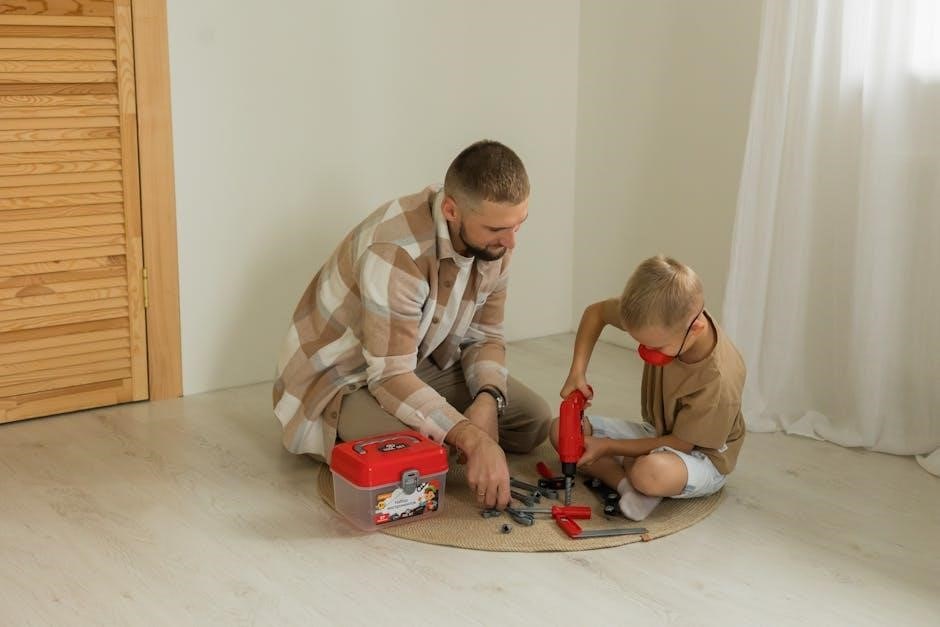the uninvited parents guide
The Uninvited Parents Guide provides insights into the 2009 PG-13 and 2024 R-rated versions, helping parents navigate themes, content, and family dynamics effectively for informed decisions․
Understanding the Concept and Its Relevance
The Uninvited Parents Guide serves as a valuable resource for families, offering insights into navigating complex dynamics and content in media․ It focuses on films like The Uninvited (2009 PG-13 and 2024 R-rated), analyzing themes, language, and maturity levels to help parents make informed decisions․ The guide also addresses real-life challenges, such as dealing with uninvited behavior in children and setting boundaries with extended family․ By providing practical strategies and content analysis, it equips parents with tools to foster healthy communication and conflict resolution․ Its relevance lies in its dual approach—evaluating media content while offering actionable advice for everyday parenting dilemmas, making it a comprehensive guide for modern families seeking to balance entertainment and values․

The Uninvited (2024): An Overview
The Uninvited (2024) is an R-rated comedy-drama featuring Pedro Pascal and Elizabeth Reaser, exploring mature themes with language and drug use, making parental discretion essential․

Exploring the R-Rated Comedy-Drama and Its Themes
The 2024 film The Uninvited blends humor with darker, mature themes, creating a complex narrative that appeals to adult audiences․ Its R-rating reflects explicit language, drug use, and adult situations, which are central to its storytelling․ The comedy-drama explores themes of identity, relationships, and societal pressures, offering a mix of witty dialogue and emotional depth․ While the humor may attract younger viewers, the film’s content is clearly intended for mature audiences․ Parents should be aware of the explicit material and consider whether it aligns with their values and boundaries․ The film’s ability to balance lighthearted moments with serious topics makes it a compelling yet controversial choice for family discussions about media consumption․

Is The Uninvited (2024) Suitable for Teens?
The Uninvited (2024) is rated R for language and drug use, making it unsuitable for younger audiences․ Parental discretion is strongly advised due to mature content․
Age Rating and Content Analysis

The Uninvited (2024) carries an R-rating due to explicit language and drug use, making it unsuitable for younger audiences․ The film contains mature themes, including strong dialogue and scenes involving substance abuse, which may not align with parental standards for teens․ While the humor and drama can appeal to older viewers, the content is geared toward adult audiences․ Parents should exercise discretion, as the film’s tone and subject matter may not be appropriate for minors․ The R-rating reflects the inclusion of elements that require a higher level of maturity to process responsibly․ Teens exposed to such content may need guidance to understand the implications and context of the scenes presented․ This analysis helps parents make informed decisions about whether the film aligns with their values and standards for their children․

The Uninvited (2009): A PG-13 Perspective
Directed by Charles and Thomas Guard, this PG-13 film explores loss, grief, and supernatural themes through Emily Browning’s character․ It includes violence and sensuality, making it suitable for teens with caution․

Comparing the 2009 Version with the 2024 Film
The 2009 version of The Uninvited is a PG-13 horror film directed by Charles and Thomas Guard, focusing on grief and supernatural themes․ It follows a young woman, Anna, as she copes with her mother’s death and her father’s new relationship with her mother’s nurse․ The film explores family dynamics and emotional turmoil, with moderate violence and sensuality․
In contrast, the 2024 R-rated comedy-drama version stars Pedro Pascal and Elizabeth Reaser, offering a darker, more adult-oriented take․ It delves into themes of loss, identity, and dysfunctional relationships, with stronger language and drug use․ The 2024 film expands on character development and adds humor, making it distinctly different in tone and content from its 2009 counterpart․ Parents should note the shift in maturity and themes when deciding suitability for teens․

Dealing with Uninvited Behavior in Children
Children often ignore parents to assert control․ Setting clear boundaries, encouraging responsibility, and modeling respect can help address this behavior effectively while fostering healthy communication and mutual understanding․
Strategies for Parents to Address Ignorant Behavior
Addressing ignorant behavior in children requires a balanced approach․ Start by understanding their need for control, often behind deliberate ignoring․ Set clear, consistent boundaries and consequences while encouraging open communication․ Positive reinforcement for respectful behavior can motivate change․ Stay calm and patient, avoiding power struggles․ Encourage responsibility and model the respect you expect․ Active listening can help children feel heard, reducing defiance․ Teaching problem-solving skills empowers them to manage emotions and decisions․ Consistency is key to fostering accountability and respect in family dynamics, helping children grow into considerate individuals․

Setting Boundaries with Extended Family
Establishing clear boundaries with overbearing parents or in-laws is crucial․ Communicate your expectations respectfully and consistently enforce them to maintain healthy family dynamics and mutual respect․
How to Handle Overbearing Parents or In-Laws
Handling overbearing parents or in-laws requires a balance of respect and assertiveness․ Start by setting clear boundaries, such as limiting unannounced visits or discussions about sensitive topics․ Communicate your expectations calmly and firmly, ensuring they understand your needs without feeling attacked․ Consistency is key—reinforce these boundaries gently but persistently․ If tensions arise, consider involving your partner to present a united front․ Encourage open dialogue to address underlying concerns, but avoid engaging in arguments․ Prioritize your emotional well-being by maintaining personal space and seeking support from trusted friends or professionals if needed․ Remember, respectful communication and mutual understanding can help mitigate conflicts and foster healthier relationships․

Communication Strategies for Effective Parenting
Active listening and conflict resolution are essential for effective parenting, fostering understanding and mutual respect in family dynamics․
Active Listening and Conflict Resolution
Active listening is a cornerstone of effective communication, allowing parents to understand their children’s perspectives without judgment․ By giving full attention and validating emotions, parents can foster trust and openness․ Conflict resolution skills, such as remaining calm and focusing on solutions, help de-escalate tensions and teach children how to manage disagreements constructively․ These strategies are particularly useful when addressing issues like ignoring behavior or setting boundaries with extended family․ Encouraging open dialogue and modeling respectful communication helps create a supportive environment for family dynamics to thrive․
- Practice patience and empathy during conversations․
- Encourage expression of feelings and concerns․
- Focus on collaborative problem-solving․
These approaches strengthen relationships and equip children with essential life skills․
Navigating family dynamics requires balance, understanding, and effective communication․ The Uninvited Parents Guide offers valuable insights to help families address challenges while fostering healthy relationships and independence․
Final Thoughts on Navigating Family Dynamics
Navigating family dynamics requires a delicate balance of communication, boundaries, and understanding․ Parents must address uninvited behavior in children by setting clear expectations while fostering open dialogue․ Extended family, such as overbearing in-laws, can be managed through respectful yet firm communication․ Active listening and conflict resolution are essential tools for resolving disputes without escalating tensions․ By fostering mutual respect and empathy, families can create a supportive environment where everyone feels valued․ Addressing these challenges proactively helps build stronger, healthier relationships․ Ultimately, parents guide their children by modeling positive behavior and teaching them how to navigate complex social interactions effectively․ This approach not only resolves current issues but also equips children with lifelong skills for managing relationships․

